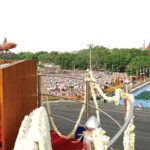THERE has been a spurt of media articles, editorials and television debates after the new Government has come to power giving the impression that the government is exerting bureaucratic control to manipulate the working of the newsroom in both wings of Prasar Bharati Doordarshan and Akashvani.
What is not known is that the splurge of media articles could be a pressure tactic to draw the attention of the new regime and seek administrative and financial control in the garb of functional autonomy.
When the entire board is lying vacant, who is taking all the ‘autonomous’ decisions of the 33,000-strong organisation? The Chairman, Member (Finance), Member (Personnel) and its six part-time members are still to be nominated. Both the ex-officio members Director-General (Akashvani) and Director-General (Doordarshan) are ad hoc appointees and thus cannot wield any real authority. The entire power of the board is concentrated in the hands of the chief executive officer, who himself is a superannuated bureaucrat and wants to re-write the Government of India rules, or so it seems.
In such a scenario, all decisions taken by a superannuated bureaucrat are made to look like board decisions. The CEO is ably assisted by a twice retired loyal lieutenant as Principal Adviser. The CEO now desires to have the authority and control over serving officers of the Government of India! The CEO is openly demanding (by going to the media) financial and administrative autonomy so that he can transfer and post officers according to his whims and fancies and also stop their salaries without any questions being asked! So that, with so much money at his disposal, economy class tickets could be upgraded to business class!
Prasar Bharati’s culture of censorship
How the public broadcaster nixed the telecast of Loknayak, a film on JP, as it did not suit the then political masters
The exclusive and elaborate coverage of Prasar Bharati in the August issue of gfiles prompted me to look at my book: JP in Jail An Uncensored Account (Roli Books, 2006) and reminisce about the harsh censorship mindset prevailing even three decades after Emergency. This episode also reflected the shoddy attitude of the BJP-led NDA I towards JP. Though the birth centenary of JP was in 2002, a telefilm was commissioned only in 2004 and by the time it was produced, UPA I had taken charge!
I am reproducing below an extract from the book:
“This was the saga (Emergency) that Director-Producer Prakash Jha was trying to capture as part of his Telefilm ‘Loknayak’ (People’s Leader) that he produced for the State-owned TV channel Doordarshan. This Film (in which I had played a role) was scheduled for nation-wide telecast on October 11, 2004, the 102nd birth anniversary of JP, but was pulled out at the last moment by the present pro-Emergency rulers. Instead an internal letter, dated October 13 and sent from Prasar Bharati to the Ministry of Culture, was faxed to Prakash Jha:
PRASAR BHARATI
DIRECTORATE GENERAL: DOORDARSHAN
DOORDARSHAN BHAWAN
COPERNICUS MARG, NEW DELHI – 110 001
File No. 15/4/2003/P-IV.Part File
Sub: Telefilm ‘Loknayak’ – a film based on the life of Jayaprakash Narayan, Directed by Prakash Jha.
Dear Sir,
This is with regard to above-mentioned film funded by the Department of Culture. The preview of the film was arranged on 29.06.2004 & 16.07.2004 & 30.09.2004, but your representative could not attend these meetings.
This letter asked for modifications/deletions in the film as below:
1. The latter part of the film (pertaining to Emergency) does not portray a balanced presentation of the event of those times, and in view of the sensitivities involved, the programme needs modifications.
2. The map of India shown in the beginning does not show the geographical boundaries of un-divided India correctly.
3. Audio in the following frames needs to be edited:
a. Tanashahi Ka Shikar Hua (victim of repressiveness)
b. Indira Hatao (remove Indira) Slogan
c. Sanjay Gandhi had a motive
d. Jail Mein Kyon Maren, Bahar Maren (let him (JP) not die in Jail but outside)
e. Tanashahiwala Rajya Nahi Chalega (A repressive State will not last)
f. Indira Ji Ne JP Ke Sath Jo Zyadati Ki (Indira’s maltreatment of JP)
g. The last portion of Sh. Devasahayam’s byte needs to be deleted.
4. Need to impose Emergency and counterpoint also should be brought out.
5. Opinionated views need to be balanced with views from all political shades.
6. Recollections of those in close touch with JP, like Dr JK Jain, who was his personal physician for 40 years, will enhance our understanding.
7. Longish scenes of Hazaribagh Jail escape and Diwali celebrations are over dramatised and need to be curtailed.
8. Credit caption of the Ministry of Culture, which has funded the project, should come in the beginning along with the credits of Producer and Prasar Bharati.
Since the Department of Culture was not represented in the preview, a VHS copy of the film is being sent with this letter.
You are requested to convey your opinions and comments for final approval before November 1, 2004.
Yours faithfully,
Sd/-
RAJ SHEKHAR VYAS
(13-10-04)
DIRECTOR OF PROGS. (CCU)
Sh. Umesh Kumar,
Dy. Secretary to Government of India
Ministry of Tourism & Culture
New Delhi
The present Government at the Centre (UPA I), which is a coalition of erstwhile pro- and anti-Emergency forces, has obviously resorted to ‘Emergency style’ self-conceited censoring and gag order. Deliberate attempts are being made to cook up history and distort facts to mislead the people of India, particularly those of the younger generation. Initially, Prakash Jha rose in revolt and rejected this censorship attempt lock, stock and barrel, and then conceded to condition 3 (g): “The last portion of Sh. Devasahayam byte needs to be deleted!”
Nothing much was left in the telefilm. My intervention with KS Sarma, the then CEO of Prasar Bharati and a batchmate of mine, on behalf of Prakash Jha was of no avail. This is the legacy of Prasar Bharati which is bankrolled by the citizens of a so-called free nation!
MG Devasahayam
It would be well if the new government takes a serious look at the whole concept of autonomy and reads the fine print to discern between functional autonomy and financial, administrative autonomy.
The genesis of the whole debate was at a time when only Doordarshan and All India Radio existed. It was felt that monopolistic control over broadcasting was not conducive for accommodating varied public opinion. But today the broadcasting scenario is dominated by private television and radio channels!
With the realisation setting in that Prasar Bharati has no relevance today and not many batting for the continuance of the white elephant, the top brass of Prasar Bharati, particularly the CEO, has been shooting letters to the Ministry of Information and Broadcasting, making it sound as if his freedom of speech is being curtailed. Functional autonomy is being confused with administrative and financial autonomy.
In a letter dated August 8, 2014 to the Secretary, he has been asking for ‘posting and transfer of Indian Information Service Officers’ numbering 300 plus in the News Divisions of Akashvani and Doordarshan, “which requires specialisation, professionalisation and hard skills in order to compete against the big private news media”. The very fact that the entire Akashvani newsroom or the general newsroom–GNR as it is popularly referred to–is filled 100 per cent with bureaucrats means it would be foolhardy to expect news sense to dominate their decision-making. The concept of balanced, unbiased and objective news is of least consequence to them.
SIMILARLY, the Doordarshan newsroom has a whopping staff strength of over 400 with only four dedicated professionals: myself, a journalist, policy formulator, communicator and academician for 33 years, who has been sidelined by the reigning Indian Information Service. The other dedicated personnel of DD News with nearly three decades of professionl experience are Giridhar Tanwar, Sudhanshu Ranjan and Rudranath Sanyal — who have also been kept away from the newsroom.
Dominated by the Indian Information Service, the newsroom is over-flowing with staff with little or no news training or experience. A large number of staffers belong to Khurja from where the erstwhile Director General (SM Khan, now shunted to RNI) hailed.
So, however much the expert committees may recommend that the newsroom be run by professionals, the fact remains that the bureaucrats have a strong hold over its functioning and are only concerned about the décor of their swanky offices. The new Director General just brought in is due to retire in a few weeks and has never worked in television, leave aside the Doordarshan newsroom. When the newsroom should be abuzz with activity, as the assembly elections are round the corner, the concern is which wall paintings should be hung on.












































